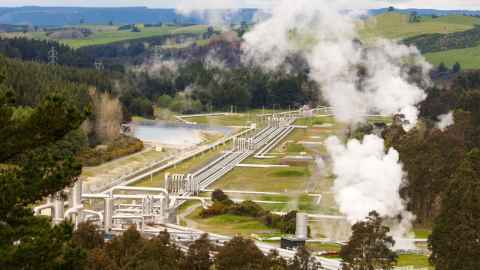New Zealand’s moonshot programme for geothermal power
25 August 2025
A $60m investment, a first-ever national strategy, and a push to double geothermal by 2040 - New Zealand’s energy moonshot is underway.

How much of New Zealand’s electricity would you think is generated by geothermal power? Would it surprise you to hear at least 20%? Last year New Zealand’s government announced a $60m investment to explore furthering New Zealand’s geothermal potential and unlock new areas for industrial growth, tourism and trade.
The investment announcement was recently followed by the issuing of ‘From the Ground Up – a draft strategy to unlock New Zealand’s geothermal potential’, New Zealand’s first ever national Geothermal Strategy. The draft strategy seeks to develop a pathway for New Zealand to extend its international leadership in geothermal innovation, accelerate domestic energy resilience, and strengthen regional economic growth associated with geothermal development. Industry practitioners, researchers, iwi, energy companies and the public have until 12 September to submit feedback on the draft.
The Government is proposing to double geothermal energy use by 2040. Key to this will be the successful implementation of supercritical geothermal - a type of geothermal energy that utilises extremely hot and pressurised water found deep within the Earth's crust. If it can be harnessed, supercritical geothermal offers a cleaner energy source than fossil fuels, with potentially lower emissions. It also poses challenges around the depth of drilling and accessing of data to make informed decisions.
Dr John O’Sullivan says “This is where innovation is required. Geothermal energy was met with scepticism and uncertainty back in the 1950s and New Zealand still forged ahead and created pioneering work that has had a lasting impact. Now it's time to scale.”
O’Sullivan is a senior lecturer in engineering and co-director of the Geothermal Institute. Since 1978, the Geothermal Institute at the University of Auckland has produced more than 2,000 graduates who have lent their expertise to industry across the globe, as well as here at home. Many have worked on research and development at the Wairakei geothermal field. Graduates are also compelling ambassadors for New Zealand’s geothermal capability and ingenuity in this sector internationally.
“Industry is poised, talent is coming through, and the technology is moving fast, with advancements in areas such as remote sensing, big data and advanced digital tools to accurately model sub-surface geothermal resources. Working hand-in-hand with industry and Māori communities and strengthening our technical capability will be critical to fulfilling New Zealand’s geothermal potential. Our universities, public research organisations like Earth Sciences New Zealand, vocational training providers and industry innovators all have a part to play – collaboration will be the key to future success.”
Within the draft geothermal strategy, the government has highlighted the importance of education and promoting and developing career pathways in geothermal.
Mike Roger is the Strategic Growth Manager for Energy and Climate Innovations at UniServices, the University’s commercialisation and research translation company. He helps communities, industry and government build partnerships with our researchers in the energy space to find new pathways to create impact.
Roger says “Industry regularly brings us big problems that need solving, and the Geothermal Institute has been great at stepping up to meet those challenges. They’re very commercially minded, and the applied nature of their research and underlying expertise lends itself extremely well to developing creative solutions. To leverage future potential, it’s important to have support for initial infrastructure development though, to lower the barrier to entry. It’s very expensive to drill wells.”
The global geothermal landscape is changing rapidly, with the United States as well as countries in Europe, Asia, Latin America and East Africa increasing investment in exploration of options for clean energy to support sustainability and spur economic growth. Another motivating factor is energy security, with interest in reducing reliance on fossil fuels or precarious energy imports. New and emerging geothermal technologies – such as supercritical and enhanced geothermal systems, deep drilling, direct heat applications, and mineral co-extraction – are making geothermal increasingly accessible and reshaping the skills and R&D requirements of the sector.
Roger notes that New Zealand’s expertise in geothermal energy and associated technologies offer an opportunity to supercharge NZ Inc’s contribution to energy resilience and decarbonisation globally, opening up new areas for international engagement and leadership.
“New Zealand’s approach to geothermal energy innovation is special. We have a compelling historical track record of entrepreneurial zeal and baseline capability that provides a real opportunity in a world seeking cleaner, reliable, renewable, and non-intermittent energy and heating solutions. We can lean into that, achieving outcomes that are truly transformative.”
Contact
Questions? Contact the Centre for Innovation and Entrepreneurship for more information.
E: cie@auckland.ac.nz